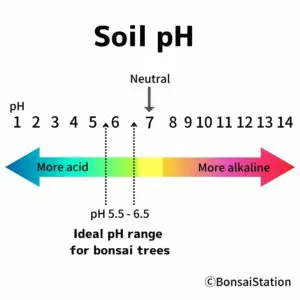The ideal soil for juniper bonsai should have good water retention, drainage and aeration while being low in nutrients. Proper drainage is particularly important for juniper bonsai and an optimal soil mix for them is a 2:1:1 blend of Akadama, lava rock and pumice.
The Best Soil for Juniper Bonsai Trees
Growing a healthy juniper bonsai tree requires more than just regular watering and fertilizing. One of the most critical factors in maintaining its health is the type of soil it’s grown in.
In that sense, juniper bonsai soil should be specifically formulated to provide the tree with the necessary drainage and aeration for optimal growth. The right soil mixture can make all the difference in the overall health and longevity of your juniper bonsai tree.
Ideal soil mix for juniper bonsai
Soil qualities needed for juniper bonsai
The best soil for juniper bonsai trees, or any bonsai trees for that matter, is one that provides good water retention, drainage and aeration while being low in nutrients.
Among these soil qualities, drainage is especially important for juniper bonsai because juniper trees prefer a drier soil. So, a good soil mixture for juniper bonsai should be well-draining yet still retain enough moisture to keep the tree hydrated.
Organic matter is not necessary for the juniper soil mix. Wild junipers grow in rocky, sandy, barren lands. They do love water but cannot tolerate wet soil. Putting the organic matter makes the soil mix retain more water than it should, which is not desirable for juniper bonsai.
Best soil mix for juniper bonsai
An ideal soil mixture for juniper bonsai trees is a 2:1:1 blend of Akadama, lava rock and pumice.

Akadama
Akadama is a granular clay-like soil that is commonly used in bonsai cultivation because of its excellent water retention and drainage properties as well as aeration ability. Pumice and lava rock are both porous materials that aid in aeration and drainage.
Akadama alternatives for juniper bonsai

Volcanic rock
If you can’t find Akadama or find it expensive, you can use vermiculite instead or increase the percentage of lava rock and pumice. They meet most of the requirements that a good bonsai soil should have; good aeration, drainage, water retention, nutrient retention and adequate soil pH.
Note that the water-holding and nutrient-holding capacities of lava rock depend on where it comes from and pumice has low water-holding and nutrient-holding capacity. If you chose the wrong product, you would have too dry soil without the capacity of holding nutrients for your trees.
For more on this topic, please read the following post.
Soil pH

Soil pH & bonsai tree
It’s important to note that juniper bonsai trees prefer slightly acidic soil with a pH level between 5.5 and 6.5.
Akadama has pH level of between 5.1-5.5, which is a little bit acidic for juniper bonsai but acceptable.
Lava rock and pumice, on the other hand, can be acidic, neutral or alkaline depending on where they come from. Make sure to choose the ones that are slightly acidic to neutral and never buy alkaline soil. It should be written on the product label.
Can you use potting soil for juniper bonsai?
Using regular potting soil for juniper bonsai trees is not recommended and here’s why.
Generally speaking, regular potting mix contains too high a percentage of organic matter such as tree bark, coco coir and sphagnum moss for juniper bonsai, which can reach as high as 30 to 50%. As such, regular potting soil retains too much moisture, which can lead to root rot.
Juniper bonsai trees require a soil mix that is well-draining and has good aeration to prevent waterlogging.
Also, this organic matter contains an abundance of nutrients, which is not suitable for juniper bonsai trees. Too much nitrogen, for example, can lead to excessive foliage growth and elongated branches, which deforms the tree’s style.
If you want to buy a ready-to-use soil mix, it is best to stick with a specially designed bonsai soil mix for the juniper bonsai trees (or coniferous trees) to ensure optimal growth and health. These mixes are specifically formulated to meet the unique needs of bonsai trees and should provide the right balance of drainage, aeration, and moisture.
Is cactus/succulent soil good for juniper bonsai?
Cactus and/or succulent soil is not an ideal option for juniper bonsai trees.
Although cactus and/or succulent soil may aim for well-drainage and good aeration, it typically has a high percentage of organic matter such as humus and sphagnum moss, which is not suitable for juniper bonsai trees.
Juniper bonsai trees require a soil mix that is mostly inorganic with very little or no organic matter. Organic matter in the soil can hold onto moisture, leading to root rot. Also, the organic matter in cactus and/or succulent soil contains too much nutrients that can result in the overgrowth of foliage.
As always, it’s best to use a specially designed bonsai soil mix for juniper bonsai trees (or coniferous trees) to ensure optimal growth and health. These mixes are formulated to meet the unique needs of bonsai trees and should provide the right balance of drainage, aeration, and nutrients.
Can you reuse old soil for juniper bonsai?

Degraded Akadama
Reusing bonsai soil for juniper bonsai is not recommended.
Reusing old bonsai soil can be a cost-effective and environmentally friendly option and in theory, you can reuse bonsai soil as long as it is still in good condition and has not degraded yet.
The important thing you should consider when reusing bonsai soil is that every soil has its expiration date, which are;
-
- Akadama: 2-3 years
- Lava rock: 5-7 years
- Pumice: 3-5 years
So, if you are using Akadama, lava rock and pumice mix for your juniper bonsai, you won’t be able to reuse the soil in most cases because juniper bonsai should be repotted every few years and by that time, the soil mix is degraded and not reusable.
Also, reusing bonsai soil mix has a risk of spreading diseases that are not yet manifested.
If you are considering reusing bonsai soil, the following post will help you understand how and when to reuse it.
How to make juniper bonsai soil at home
What you need for making juniper bonsai soil
To make juniper bonsai soil mix at home, you need;
-
- Soil,
- Soil scoop (optional),
- Soil sieve, and
- A few containers to mix and store soil.
Types of bonsai soil
The types of soil you should prepare for the juniper bonsai soil mix are;
-
- Akadama
- lava rock, and
- Pumice.
Make sure to choose a small particle size of between 1/16 to 1/4 inches (or 2 mm to 6 mm). Juniper roots are very fine and do not grow well enough in larger particle soil.
Note that the juniper bonsai soil mix does not need organic ingredients.
A step-by-step guide to making juniper bonsai soil
Here’s a step-by-step guide to making your own juniper bonsai mix at home.
-
- Before mixing the soil, use soil sieves to separate out the different particles by their relative size and put each size in different containers. This step will also allow you to remove silt which makes the soil mix less drained and aerated.
- Prepare a clean bucket or container box. If it is used before, wash it thoroughly to get rid of any mold or bacteria that may cause infestation.
- Pour each type of soil of the same particle size you prepared into the container, according to the soil mix ratio of 2:1:1 blend of Akadama, lava rock and pumice. Make sure to use small particle sizes. Preparing a bit more than needed may save you time.
- Mix the soil well using your hands.
The following post might be helpful for more detailed information on making bonsai soil mix.



